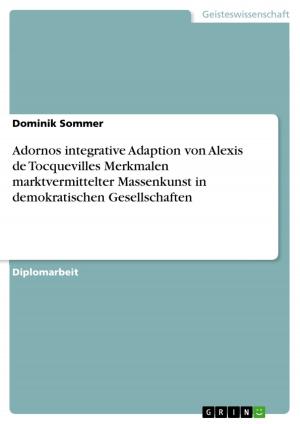Environmental Impact of Jeans Laundries in Northeast Brazil
Nonfiction, Science & Nature, Science, Earth Sciences, Geography| Author: | Sören Noack | ISBN: | 9783640865734 |
| Publisher: | GRIN Verlag | Publication: | March 14, 2011 |
| Imprint: | GRIN Verlag | Language: | English |
| Author: | Sören Noack |
| ISBN: | 9783640865734 |
| Publisher: | GRIN Verlag |
| Publication: | March 14, 2011 |
| Imprint: | GRIN Verlag |
| Language: | English |
Research Paper (undergraduate) from the year 2008 in the subject Geography / Earth Science - Physical Geography, Geomorphology, Environmental Studies, grade: 1,3, Brandenburg Technical University Cottbus, language: English, abstract: Fast economic growth is often given higher importance than a more sustainable development. The textile cluster around Caruaru in Northeast Brazil serves as an example. For this rather poor region the textile industry is of high economic im-portance. However, jeans production goes along with severe environmental im-pacts. For years, a 'devil's deal' between authorities and entrepreneurs (Tendler 2002) fortified the situation and inhibited any improvements of working conditions and environmental impacts. During the past years however, the situation has started to change. While aspects of high water consumption and pollution have already received attention (Almeida 2005), the field of energy efficiency in jeans laundries has been left aside. There exists a huge potential to reduce the consumption of firewood by several measures such as improved insulation, reclamation of heat energy and solar heating systems to reduce consumption of firewood, which is in most cases of illegal origin. The aim of this paper is to present environmental impacts of the jeans industry in the case of jeans laundries in Northeast Brazil and to discuss possible solutions under the given socio-economic constraints of this region. First, some general background information is provided in order to point out the outstanding importance of the clothing industry for the local economy. Chapter 3 contains an analysis of the environmental problems caused by wastewater and residuals, as well as applied solutions. Chapter 4 adresses issues regarding energy efficiency in steam and hot water production. Finally, an outline for the future of jeans industry is provided.
Research Paper (undergraduate) from the year 2008 in the subject Geography / Earth Science - Physical Geography, Geomorphology, Environmental Studies, grade: 1,3, Brandenburg Technical University Cottbus, language: English, abstract: Fast economic growth is often given higher importance than a more sustainable development. The textile cluster around Caruaru in Northeast Brazil serves as an example. For this rather poor region the textile industry is of high economic im-portance. However, jeans production goes along with severe environmental im-pacts. For years, a 'devil's deal' between authorities and entrepreneurs (Tendler 2002) fortified the situation and inhibited any improvements of working conditions and environmental impacts. During the past years however, the situation has started to change. While aspects of high water consumption and pollution have already received attention (Almeida 2005), the field of energy efficiency in jeans laundries has been left aside. There exists a huge potential to reduce the consumption of firewood by several measures such as improved insulation, reclamation of heat energy and solar heating systems to reduce consumption of firewood, which is in most cases of illegal origin. The aim of this paper is to present environmental impacts of the jeans industry in the case of jeans laundries in Northeast Brazil and to discuss possible solutions under the given socio-economic constraints of this region. First, some general background information is provided in order to point out the outstanding importance of the clothing industry for the local economy. Chapter 3 contains an analysis of the environmental problems caused by wastewater and residuals, as well as applied solutions. Chapter 4 adresses issues regarding energy efficiency in steam and hot water production. Finally, an outline for the future of jeans industry is provided.















